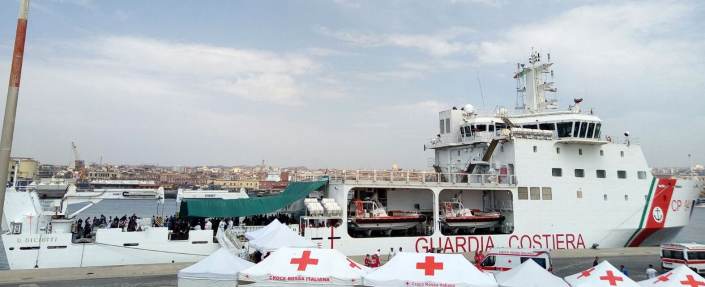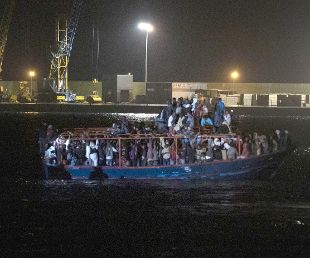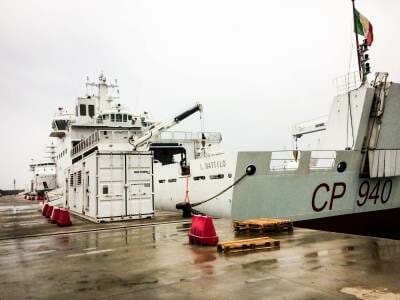“They Leave As People, They Arrive As Ghosts” Shipwrecks And Push-Backs At Sea. Italy Closes The Doors, Including To Those Who Manage To Arrive
On June 12th a Swedish ship belonging to Frontex landed at Catania, with 356 migrants on board and 8 bodies. The survivors spoke of a dozen missing and the collapse of their rubber boat, packed with people far beyond its capacity. Only a few days later, a group of Sudanese migrants reported a boat which had broken apart after two days at sea, from which only a dozen people had been saved. Other refugees reported having met Syrian women and children in Libya: they had just been “brought back” to the departure point by the local Coast Guard and themselves told of having seen other small wooden boats go under.

The Italian Coast Guard vessel Diciotti in port at Catania
The corpses of women, men, children and new-born babies have arrived over the last week, killed by Fortress Europe’s criminal policies. Protecting its own economic interests, trying to block every legal route and strengthening borders means condemning thousands of people to violence and death. A war has been waged against migrants for years, all the more cruel for the deceit of institutional narratives, stories which sound exponentially hypocritical and manipulative in the face of those who have to deal with death every day.
Blocking the Departures, Aiding Other Trafficker
“Everyone known the trafficker who runs the departures in Sabrata, and that he pays off the police to let the boats leave. He often pays for ten rubber boats to have a free pass, but then pushes off another 5, 7 or 10 more, which are the ones which are then intercepted and sent back. Then you find you have to start all over again: prison, slave labour, asking money from your family and paying for a new trip.” ‘O.’ arrived in Italy two months’ ago after his third attempt to cross the sea. He was in Libya for 6 months and tells us that “it only takes a second change from a man into mincemeat: it just takes a gesture, a word or the idiocy of someone or other and you’ve got a bullet in your chest and you stop breathing.” ‘O.’ adds that he could tell us about hundreds of moments when “money changed hands, the Libyans paid the police, bribed people in the Libyan Coast Guard, everyone trying to line their own pockets”. And always at the cost of people who have no choice but to leave.The Libyan Coast Guard, along with other mercenaries and vessels, bring the migrants back to the centres from which they have only just managed to flee, places where the only option is to attempt the journey again, all while rumours are spreading of deals to take migrants back to Niger systematically, or other nearby countries.These push-backs simply help along new trafficking routes and make survival conditions in Libya increasingly unsustainable, even if it is difficult to imagine situations worse than those which exist already. Marks of violence and torture are visible on the bodies of those who arrive, and omnipresent in their witness accounts. And often is the youngest among them who are the first to talk about it.
Is Italy A Country Which Respects Human Rights?
Their suffering does not end in Libya however. Hundreds of people are saved at sea only to arrive in the ports of Augusta and Catania, forced to spend days and nights on board the ship before setting foot on dry earth. Some even decide to thrown themselves into the water in order to focus attention on their own weak state, as happened at the port of Pozzallo on June 25th. At the point of arrival, doctors and psychologists from NGOs report ever clearer signs of abuse, but frequently there is no space necessary to guarantee any adequate protection. The reception system is trumped by the police’s own system every time, who continue to search for the “suspected boat drivers” among the new arrivals, to satisfy the hunger of public opinon.

The Phoenix at Pozzallo
During the recent series of landings, we watched the investigations which take place on the quayside, frequently with an astonishing rapidity which worryingly probably begins with the investigations at sea. The selections of potential witnesses and suspected boat drivers seems to be even faster than usual, as we saw during the disembarking from the Phoenix at Pozzallo on June 20th. The legitimacy of some of these activities remains in doubt, but the willingness to continue harassing witnesses and leave the guilty in peace seems clear enough.
North African citizens, for the most part Moroccans, continue to receive rejection notices by the hundred, with papers often translated only by an interpreter. Over the past few weeks we have met and spoke with some of them at the Catania train station. They hold a “deferred rejection notice” between their hands, with a written translation only in French even if the vast majority only understand Arabic. Among the various groups of Moroccan citizens who have been rejected in this manner, we note the presence of two vulnerable women left on the streets of Palermo, completely abandoned to themselves. The only support they received was from some volunteers who were determined to try and guarantee them some protection and human solidarity. In this system even fundamental human rights are denied from “economic migrants”!“They’re arriving in ever worse condition, they’re sending us ghosts, not people. The last time a dozen people arrived from the port with serious wounds, like we’re a hospital. Here they get registered and split up into groups. Then the confusion starts. In the past we’ve even had a thousand people in one go, I don’t if I can explain what that means.” ‘P.’ is a worker in the CARA* at Mineo, who tells us of refugees with serious wounds brought directly from the port of Catania to the CARA around a month ago. “Transferrals from port of Catania are especially chaotic and confused. When they don’t know where to send people, they always send them to Mineo”.Transfers to places further away do not, however, seem to take place in better conditions.

| The Fiorillo in port at Catania |
Only a few days ago, on June 27th, a group of Bangladeshi citizens arrived at Catania on board the Fiorillo and were then transferred to the Hub in Bologna. After many long hours waiting in the port for an exhausting bus journey throughout the night, they too had to go through all the instability of a system stuck in an “emergency” phase, in which chronic overcrowding means the systematic use of tent structures set up outside the hostels. Those on the ground pass the buck and no one ends up truly reporting with any clarity the total inadequacy of an organisational method which is unable to deal with the facts of the matters.People suffering shock, wounds from knives and fire, victims of violence and sexual abuse – these are the conditions of migrants who have arrived in recent days in all of Sicily’s ports, and elsewhere. In response to all of this, the Italian government has made demands on the European Commission, bringing to the surface the projects it has been working on for months. It is now clear how the proposal to take greater control over the NGO vessels, and the hypothesis of denying some of them entrance to Italian ports, is connected to the desire to continue fortification, militarisation and the externalisation of borders to Libya, along the same lines at the deal struck with Turkey in March 2016, the dramatic and inhumane consequences of which we can still see today, consequences which weigh heavily on migrants themselves.Today journalists across Europe have their cameras pointed at the meeting of EU Ministers of the Interior scheduled for next Thursday, eager to known what the next move will be by the different agents at play.
Two days ago, the corpses of another 9 migrants reached the port of Catania. On both the southern and northern coasts of the Central Mediterranean, the dead continue to pile up along with the ghosts of a war waged every day, despite the silence of the media, and against which an ever stronger resistance must be built.
Lucia Borghi
Borderline Sicilia
Project “OpenEurope” – Oxfam Italia, Diaconia Valdese, Borderline Sicilia Onlus
*CARA = Asylum Seeker Reception Centre [Centro di Accoglienza per Richiedenti Asilo]
Translated by Richard Braude



